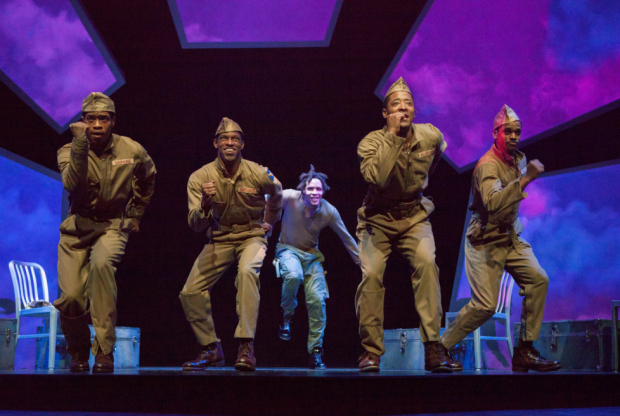Fly

(© Jim Cox Photography)
Nothing beats a rousing underdog story, and you don't get more odds-defying than the Tuskegee Airmen, who were plucked from various universities around the country, and internationally, and drafted into the U.S. Army's Pilot Training Program in segregated Tuskegee, Alabama. Since the military needed servicemen to train as army air escorts during World War II, these black soldiers were trained to fight for their country even while it denied them basic civil rights.
Fly, written by Trey Ellis and Ricardo Khan and currently running at the Pasadena Playhouse, treats the exploits of the Tuskegee Airmen with a mixture of glory, reverence, and rich theatricality. The revival of Fly, directed by Khan and coproduced by the Crossroads Theatre (CTC), will move to New York's New Victory Theater in March and then back to CTC's home base in New Brunswick, New Jersey. L.A. area audiences should catch this marvelous production before it soars off into the sunset.
Telescoping this chapter of history into 90 mind-blowing minutes, Ellis and Khan chart the stories of four black servicemen, three Americans and one from the West Indies, as we see them train, earn their wings, and ultimately go into combat against German aircrafts in enemy skies. The play combines incidents of triumph and failure, flashing back from the inauguration of our first black president and using the experiences of the Tuskegee Airmen as a cultural touchstone and sociological barometer. Ellis and Khan's play will win no subtlety prizes, but even with its outrage and at times heavy messaging on full display, the play succeeds marvelously.
The Tuskegee program graduated nearly 1,000 airmen; Fly gives us four: Chet Simkins (played by Desmond Newson), J. Allen (Damian Thompson), W.W. (Brooks Brantly), and Oscar (Terrell Wheeler). Khan has assembled a strong ensemble whose characters represent a nice spectrum of backgrounds that these airmen possessed. Chet is essentially Fly's narrator, reflecting on his days as a timid young enlistee whose experience in 1943 gives him an education into the ways of the world. But the heart of the play is a force of nature called the Tap Griot played by Omar Edwards. Tap Griot's spirited, high-intensity movements and dialogue underscore what all four characters are experiencing. Meshing with Khan's staging and the work of the production's technical team, Edwards' words helps transform Fly from play into an electric choreopoem.
Although they will end up bonding, the four airmen don't initially like each other. W.W. is a self-adoring slickster from Chicago who enlisted, in large measure, to impress women. Those motives don't go over well with Oscar, a "race man," who quotes Marcus Garvey and recognizes the broader implications of his company's situation and feels every racial slight like iodine to an open wound. Equally proud is J. Allen (Thompson), a well-educated recruit from the British West Indies. Chet, who worked as a janitor at an airfield and came to Tuskegee already a certified pilot, is the company's junior member. The older airmen initially dismiss the kid, and the top brass don't know that Chet is not yet 18.
Convinced that most of them will "wash out" of the program, the airmen are jockeying for position, one-upping each other and occasionally resorting to violence. Outside their own ranks, encounters are even more incendiary. The company's training officer is the bigoted Captain O'Hurley (Anthony J. Goes) who does not believe that training "flying monkeys" is in any way serving his country. Late in the play, a pre-flight encounter before a key mission between Chet, W.W., and a pair of white bomber pilots (played by Ross Cowan and Brandon Nagle) begins with an edge and ends up being a comic highlight.
The backdrop of Beowulf Boritt's beautiful set is essentially the inside of an enormous airplane cockpit with an assortment of aerial projections (designed by Clint Allen) helping to take the action skyward. For depictions of test flights and combat missions alike, the lighting scheme of Rui Rita & Jake DeGroot and John Gromada's sound and orchestrations superbly enhance Fly's technical palette.
Though Fly is not a musical, Khan's production contains several scenes with accompanying music and movement that give the production an exciting level of richness. With choreographer Hope Clarke guiding the steps, marching drills, graduation ceremonies, and campfire cavorting, all become part of the play's tapestry. And whether he is in motion or at rest, there is no taking your eyes off Edwards' remarkable Tap Griot.
The script of Fly specifies that the performance is to be intermission-less, stating "Nobody rests until the end." Given the weight of the issues at play and the power of the experience, Fly accomplishes its mission and then some.











